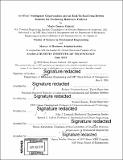| dc.contributor.advisor | Kalyan Veeramachaneni and Tauhid Zaman. | en_US |
| dc.contributor.author | Orozco Gabriel, Mario | en_US |
| dc.contributor.other | Leaders for Global Operations Program. | en_US |
| dc.date.accessioned | 2016-09-13T19:23:31Z | |
| dc.date.available | 2016-09-13T19:23:31Z | |
| dc.date.copyright | 2016 | en_US |
| dc.date.issued | 2016 | en_US |
| dc.identifier.uri | http://hdl.handle.net/1721.1/104304 | |
| dc.description | Thesis: M.B.A., Massachusetts Institute of Technology, Sloan School of Management, 2016. In conjunction with the Leaders for Global Operations Program at MIT. | en_US |
| dc.description | Thesis: S.M. in Engineering Systems, Massachusetts Institute of Technology, Department of Mechanical Engineering, 2016. In conjunction with the Leaders for Global Operations Program at MIT. | en_US |
| dc.description | Cataloged from PDF version of thesis. | en_US |
| dc.description | Includes bibliographical references (pages 93-96). | en_US |
| dc.description.abstract | Dell's target to provide quality products based on reliability, security, and manageability, has driven Dell Inc. to become one of the largest PC suppliers. The recent developments in Artificial Intelligence (AI) combined with a competitive market situation have encouraged Dell to research new opportunities. Al research and breakthroughs have risen in the last years, bringing along revolutionary technologies and companies that are disrupting all businesses. Over 30 potential concepts for Al integration at Dell Inc. were identified and evaluated to select the ones with the highest potential. The top-most concept consisted of preventing in real time the failure of hardware. This concept was investigated using a data science process. Currently, there exist a number of machine learning tools that automate the last stages of the proposed data science process to create predictive models. The utilized tools vary in functionality and evaluation standards, but also provide other services such as data and model storage and visualization options. The proposed solution utilizes the deep feature synthesis algorithm that automatically generates features from problem-specific data. These engineered features boosted predictive model accuracy by an average of 10% for the AUC and up to 250% in recall for test (out of sample) data. The proposed solution estimates an impact exceeding $407M in the first five years for Dell Inc. and all of the involved suppliers. Conservatively, the direct impact on Dell Inc. is particular to batteries under warranty and is expected to surpass $2.7M during the first five years. The conclusions show a high potential for implementation. | en_US |
| dc.description.statementofresponsibility | by Mario Orozco Gabriel. | en_US |
| dc.format.extent | 96 pages | en_US |
| dc.language.iso | eng | en_US |
| dc.publisher | Massachusetts Institute of Technology | en_US |
| dc.rights | M.I.T. theses are protected by copyright. They may be viewed from this source for any purpose, but reproduction or distribution in any format is prohibited without written permission. See provided URL for inquiries about permission. | en_US |
| dc.rights.uri | http://dspace.mit.edu/handle/1721.1/7582 | en_US |
| dc.subject | Sloan School of Management. | en_US |
| dc.subject | Mechanical Engineering. | en_US |
| dc.subject | Leaders for Global Operations Program. | en_US |
| dc.title | Artificial intelligence opportunities and an end-do-end data-driven solution for predicting hardware failures | en_US |
| dc.type | Thesis | en_US |
| dc.description.degree | M.B.A. | en_US |
| dc.description.degree | S.M. in Engineering Systems | en_US |
| dc.contributor.department | Leaders for Global Operations Program at MIT | en_US |
| dc.contributor.department | Massachusetts Institute of Technology. Department of Mechanical Engineering | |
| dc.contributor.department | Sloan School of Management | |
| dc.identifier.oclc | 958277902 | en_US |
